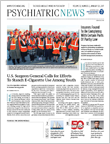There are lots of good reasons to run for office at APA. You can do a lot of good. You can work with our members to find solutions to the problems of practicing in the real world. You can go to Capitol Hill to urge the Senate or the House to work toward providing the kinds of services that our patients need. You can work “across the aisle” (Democrats and Republicans, that is) to encourage support for the research essential to finding new interventions for the illnesses we treat.
But there are other reasons why running for office is a good idea. If you win, you will learn a tremendous amount. Naturally, it was very plain to me during my year as president-elect and for the last seven months as president that I was drinking from a firehose. So much to learn about policy and how to try to influence it. So much to learn about the major insurers and federal agencies that determine how payments are made. So much to learn about bringing together members of the Board or the Assembly to make the best decisions for APA.
But it was crystalized for me today, my second day as chair of a major department (see page 6), that this knowledge would not only help me for the next five months of my presidency but also be a tremendous asset as a departmental leader.
I was early to my first meeting of the clinical chairs. I wanted to make sure that I found the room, that I did not feel rushed. The agenda was on the table, and there it was: MACRA, MIPS, APM. The chief medical officer reassured us with his usual charm that this “alphabet soup” would soon begin to become intelligible, as we got through the presentations scheduled for the early morning meeting.
I was relieved that at least for this one hour, I would not be trying to wrap my head around yet another totally new concept, workflow, priority. My work with APA has taught me quite a bit about MACRA (Medicare Access and CHIP Reauthorization Act of 2015), MIPS (Merit-Based Incentive Payment System), and the Advanced Alternative Payment Model (APM) incentive payment provisions, and this would come in quite handy now as a new department chair.
You might ask what drives someone to make a major career move at this stage of the game, especially in the midst of the presidency of APA. I confess I was minding my business in December 2014 when the call came. The chair of the search committee told me he thought I would be an excellent chair and asked me to apply for the job. “No, thanks. I have a great gig here at Columbia,” I said. Having been at Columbia for 27.5 years at that point, it hardly seemed worth moving. Undeterred, he made his case and ultimately reminded me that I had nothing to lose by coming to interview. He reassured me that no one would hold it against me if I decided not to take the job, were it to be offered.
So I went. My son warned me: “You know, Mom, they have a reputation for making you really want to go there.” I was not worried.
Naturally, there was a confluence of factors that led me to decide to go once the offer was made. I had, as my son had predicted, met many brilliant, warm, collegial, and persuasive faculty members. That was one part. I had been vice chair for education and training director for eight years, and I did have that pretty much sorted out. I knew what I was doing, which is good. And bad. Importantly, I wondered what it would be like this coming May, when my term as APA president was over. Would it feel as exciting to go back to my prior work in education and research? Where I knew exactly what I was doing? I worried about that.
After much deliberation, I decided that I needed a new challenge–something where I would have to learn a lot, just as I had when I transitioned from community psychiatrist to researcher, from researcher to education administrator, from member of APA to secretary, and then president-elect and president. And so here I am. It is only day two but I can tell you that it is a super-exciting opportunity. It is so much fun to learn nonstop and meet all the new fascinating and knowledgeable people with whom I now work!
This excitement reminded me yet again of something that I would tell every one of my residents when they arrived at Columbia: “One of the most wonderful things about psychiatry is just how varied it is. You can change your career every few years, as I have done. Or not.” ■
So yes, serving the APA is good in many ways, including learning about health care delivery in this country, and advocating for what is good for our patients, good for our members, and good for our profession. We are very lucky to have an election slate jam-packed with excellent candidates. These members are generously offering to work for you and the APA, and of course, they too will learn a lot.
Now, have you voted yet? I certainly do hope so! But if you haven’t, there are still a few days left. Please vote. Let your voice be heard. Make a difference for the APA today. And, if you haven’t already, think about getting more involved in APA by running for office at the national or district branch level or being considered for appointment to an APA council or committee. ■

